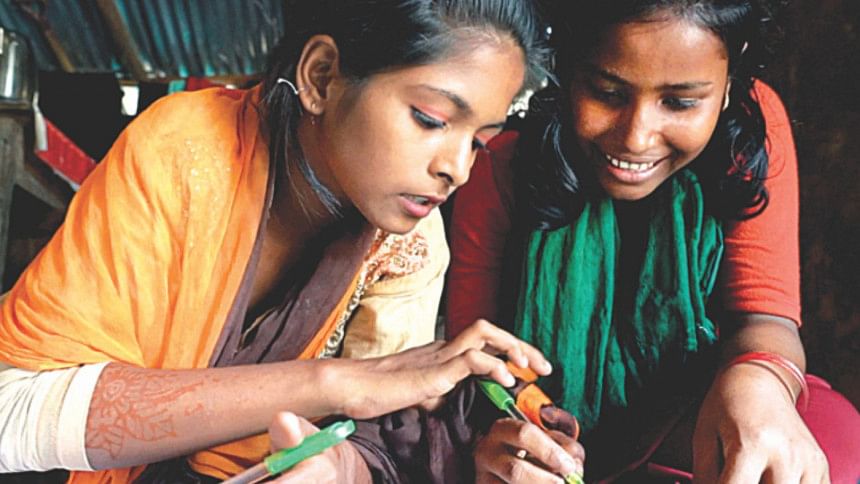How one Rohingya girl avoided missing out on school

When Rajima, a 10-year-old Rohingya refugee, arrived in Bangladesh in August 2017 she was traumatised, exhausted and frightened. She and her family had recently seen soldiers raze most of their village in Myanmar to the ground.
Rajima, her parents and three siblings were taken by truck to Hakimpara camp. As the confused and disorientated refugees disembarked, Rajima was noticed by Tasmin, a Bangladeshi girl of the same age who lives close to Hakimpara.
“When I saw her family arriving, I felt so sad for them because they had nothing,” Tasmin said.
The pair started chatting and became immediate friends.
Tasmin asked Rajima if she wanted something to eat. “She looked very thin and could hardly speak,” Tasmin recalls.
“My father asked her family if they wanted to stay in our house, because at that time they had no shelter available for them in the camp.
“They ended up staying with us for one month. During that time we became best friends.”
When Rajima's family was given space to build a shelter in Hakimpara – about 50 minutes' walk from Tasmin's house - she was unable to go to school because her parents needed her to help with housework.
But Tasmin was determined that her friend should not miss out.
“I meet her every day after school and help her to read and write. It makes me really happy to do it.”
Rajima expresses her gratitude to her friend.
“I'm really thankful to Tasmin because she taught me many things. She has helped me many times when I need it, and that's why I love her.”
Such is the girls' friendship that they hope to remain close in the future.
“When we grow up we want to be doctors and help people together,” Rajima says.
Tasmin nods in agreement.
"I want to help the Rohingya and the Bangladeshi people," she says.
“As a result, we have cohorts of children of varying ages, all at roughly the same level who are hungry to learn. We have to find a way of creating a structure which can deal with that.”
For adolescents, the LCFA would provide pre-primary and primary level education in English, Burmese, mathematics, science and life-skills designed to help them deal with the risks children of their age encounter in the camp environment.
“The LCFA is an ambitious undertaking,” acknowledges UNICEF Bangladesh Representative Edouard Beigbeder. “But if we don't make the investment in education now, we face the very real danger of seeing a 'lost generation' of Rohingya children emerge, children who lack the skills they need to deal with their current situation, and who will be incapable of contributing to their society whenever they are able to return to Myanmar.”
Without the opportunity to attend school, Mohamed Faisal spends his time wandering the camp with friends, or helping out at the small shop that one of his neighbours has set up in the camp.
“I get bored,” he says. “But talking with others make me feel better.”
Another young refugee, 14-year-old, Ashadia, has even clearer thoughts about the importance of learning.
“A decent education is the best way for girls to improve their lives,” she argues, as other girls listen at a UNICEF-supported adolescents club. “With education we can challenge some of the things men tell us. We can be who we want to be.”

 For all latest news, follow The Daily Star's Google News channel.
For all latest news, follow The Daily Star's Google News channel. 



Comments